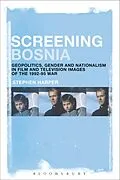The Bosnian war of 1992-1995 was one of the most brutal conflicts to have erupted since the end of the Second World War. But although the war occurred in 'Europe's backyard' and received significant media coverage in the West, relatively little scholarly attention has been devoted to cultural representations of the conflict. Stephen Harper analyses how the war has been depicted in global cinema and television over the past quarter of a century. Focusing on the representation of some of the war's major themes, including humanitarian intervention, the roles of NATO and the UN, genocide, rape and ethnic cleansing, Harper explores the role of popular media culture in reflecting, reinforcing -- and sometimes contesting -- nationalist ideologies.
Autorentext
Stephen Harper is Senior Lecturer in Media Studies at the University of Portsmouth. He has published widely on topics relating to television drama, cultural geopolitics and media images of mental distress. His previous books include Madness, Power and the Media (Palgrave, 2009) and Beyond the Left: The Communist Critique of the Media (Zero, 2012).
Inhalt
Acknowledgments
Introduction
1: The Fragmentation of Yugoslavia
2: The First Draft of History: (Mis)Reporting the Bosnian War
3: Humanitarianism and Its Others: Three 'Liberal' 1990s Bosnian War Dramas
4: Going In Hard: Masculinism, Militarism and Melodrama in the Bosnian War Action Film
5: The Subject of Rape: Phenomenological and Ideological Representations of Sexual Violence in the Bosnian War Film
6: From Nationalism to Normalization: Yugoslav and Post-Yugoslav Films of the Bosnian War
Conclusion: Neither Hollywood Nor Belgrade: Towards An Unpatriotic Cinema of the Bosnian War
Bibliography
Index
